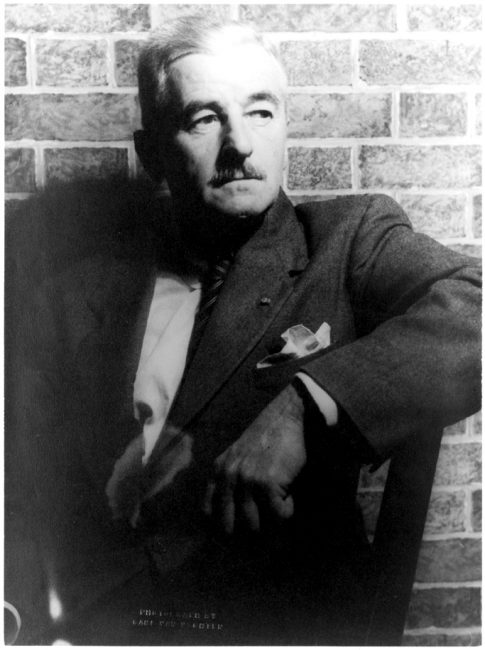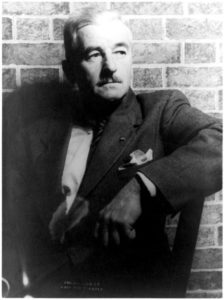William Faulkner
Nobel Prize-winning author William Faulkner lived in New Orleans and wrote some of his earliest works there.

Courtesy of Library of Congress Prints and Photographs Division
William Faulkner. Van Vechten, Carl (Photographer)
Although Nobel-prize winning author William Faulkner grew up and lived primarily in Oxford, Mississippi, his visit to New Orleans in the 1920s had a powerful effect on him. One of the greatest American writers of the twentieth century, Faulkner earned an international reputation for his novels and short stories, and won the Nobel Prize in Literature in 1949. In a sense, New Orleans opened a door into the literary world, providing the creative environment that jump-started his literary career.
Born September 25, 1897, in New Albany, Mississippi, William Cuthbert Falkner was the oldest son of Murry Falkner and Maud Butler. He grew up in Lafayette County, which later served as a model of his fictional Yoknapatawpha County. Too short to join the US Army during World War I, Falkner joined the Canadian and then the British Royal Air Force, but never fought in the war. Around 1918, he changed the spelling of his last name to Faulkner.
Before his arrival in New Orleans in November 1924, Faulkner primarily wrote poetry. His early influences included Shelley, Keats, Verlaine, Housman, and Swinburne, but also Pound, Eliot, and other modernists. He had just completed his first book of poetry, The Marble Faun, when he made an important literary connection by publishing his poem “Portrait” in a volume of The Double Dealer, a short-lived but influential literary magazine whose office was located on Baronne Street. Faulkner also came to the attention of John McClure, who reviewed The Marble Faun for the New Orleans Times-Picayune.
When Faulkner first arrived in the city, he was invited to stay with Sherwood Anderson and his wife Elizabeth in the Pontalba building just off Jackson Square. Once Faulkner settled in, he started working on prose sketches that he was able to sell to the Times-Picayune and The Double Dealer. With some literary success and money in his pocket, Faulkner stayed in the city for six months, much longer than he first intended. In March 1925, he moved in with Anderson’s friend, William Spratling, at 624 Orleans Alley (now known as Pirate’s Alley). When he returned to the city in 1926 after a trip to Europe, he stayed again with Spratling, this time on Cabildo Alley.
Although Faulkner continued to write poems, his self-definition essentially shifted from poet to fiction writer. Ever alert to his environment, Faulkner kept recording his impressions throughout this stay in the French Quarter. As Faulkner authority Carvel Collins demonstrates, the short pieces Faulkner wrote in New Orleans—later collected and published as New Orleans Sketches—contain images, motifs, and techniques that informed his later fiction. A yacht cruise on Lake Pontchartrain with Anderson and his friends, for example, provided inspiration for Faulkner’s second novel, Mosquitoes.
In 1926, Spratling and Faulkner collaborated to write Sherwood Anderson and Other Famous Creoles, a book of caricatures deftly satirizing the New Orleans literati. Anderson hosted many contemporary writers, including John Dos Passos, Thomas Wolfe, Lyle Saxon, Carl Sandburg, Hamilton Basso, Gwen Bristow, and Oliver LaFarge, many of whom he introduced to Faulkner. It was at Anderson’s urging that Faulkner began work on his first novel, Soldier’s Pay, which he eventually dedicated to his mentor and friend. Even after Faulkner left, New Orleans remained in the orbit of his imagination and surfaced in works including the 1935 novel Pylon, inspired by the opening of Shushan Airport (now known as Lakefront Airport).
In 1949 Faulkner, then still relatively unknown in the United States, won the Nobel Prize in Literature, and used part of his prize winnings to establish the PEN/Faulkner Award for Fiction. The author of more than thirty books, including twenty novels and numerous short story collections, he is considered one of the most respected writers of the twentieth century. In New Orleans, his former living quarters provide a home for Faulkner House Books. His work is also celebrated by the Pirate’s Alley Faulkner Society.
